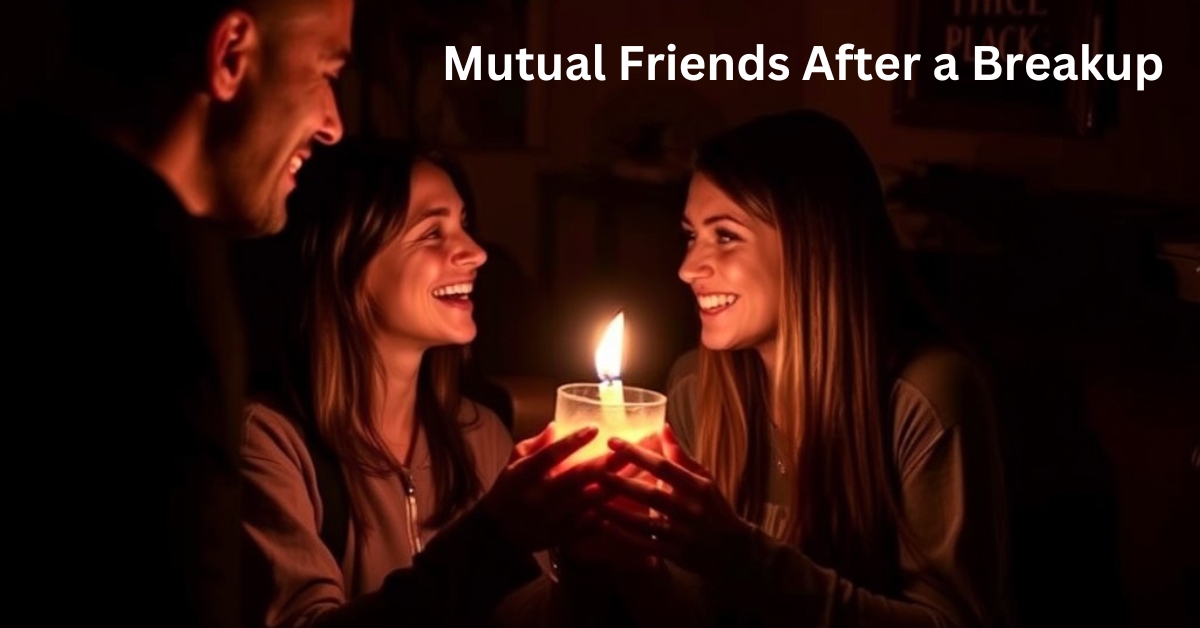Dealing with mutual friends after a breakup can be a complex and delicate process. It involves navigating the social and emotional intricacies of maintaining relationships with people who are connected to both you and your ex-partner.
The decision to stay friends with an ex or to rebuild your social circle requires careful consideration of your feelings, the dynamics of the friend group, and the impact on your personal growth.
In this blog article, we explore the key strategies for managing mutual friendships post-breakup, the emotional considerations of staying friends with an ex, and the etiquette of handling social situations involving mutual friends.
Key Takeaways
- Assess the impact of the breakup on mutual friendships and consider discussing the situation with your friend circle to minimize awkwardness and avoid taking sides.
- Set clear boundaries with mutual friends and your ex to maintain healthy group dynamics and protect your emotional well-being.
- Reconnect with supportive friends and expand your social network beyond mutual friends to rebuild your social circle and create new memories.
- Navigate invitations and social gatherings with tact, communicate your needs to mutual friends, and steer clear of gossip and negative dynamics.
- Focus on personal growth and self-care post-breakup, reflecting on the lessons learned and embracing change for a positive future.
Navigating the Social Landscape Post-Breakup
Assessing the Impact on Mutual Friendships
After a breakup, the social fabric that once seemed so tightly knit can begin to unravel, especially when mutual friends are involved. Assessing the impact on these friendships is crucial for navigating the post-breakup landscape. It’s important to recognize that friendships may shift as individuals align themselves, consciously or unconsciously, with one party or the other.
- Consider the nature of the friendships: Were they formed before or during the relationship?
- Reflect on the dynamics: How balanced were the exchanges of support and camaraderie?
- Anticipate future interactions: Will you and your ex be able to maintain a civil presence in shared social settings?
Mutual respect is the cornerstone of any post-breakup friendship dynamic. Without it, efforts to stay connected with mutual friends can quickly devolve into discomfort and tension.
Finally, open communication with your mutual friends can help set expectations and boundaries. This ensures that everyone is on the same page and can reduce the likelihood of awkward encounters or misunderstandings.
Maintaining Group Dynamics
After a breakup, the equilibrium of your social group can be as delicate as the emotions involved. It’s crucial to navigate this new terrain with sensitivity and a commitment to maintaining harmony. Start by setting clear expectations with your friends about your interactions with your ex. This might include agreements on not bringing up sensitive topics or avoiding certain social settings where discomfort could arise.
- Respect each other’s space and avoid forcing mutual friends to take sides.
- Communicate openly with the group, ensuring everyone’s comfort levels are considered.
- Be mindful of the group’s dynamics and avoid dominating conversations with breakup details.
While it’s important to honor your feelings, remember that your friends are also adjusting to the change. Strive for a balance that allows everyone, including yourself, to feel at ease in the group setting.
Remember, maintaining group dynamics is not just about preserving friendships; it’s about fostering an environment where everyone can thrive post-breakup. This includes being aware of when to step back and allow others to share their experiences and support.
Setting Boundaries with Friends and Your Ex
After a breakup, it’s essential to establish clear boundaries with your ex-partner to facilitate healing. Remember, setting boundaries is a crucial step towards your emotional well-being. It’s not just about creating distance; it’s about respecting each other’s space and the new dynamics of your relationship as friends—if that’s the path you choose.
Forgiveness may play a role in this process, but it’s also important to avoid situations that might lead to confusion or discomfort, such as flirting or a ‘friends with benefits’ scenario. Here are some practical steps to consider:
- Take some time for yourself first.
- Forgive your ex if you’re mad at them.
- Avoid any flirting.
- Don’t try a ‘friends with benefits’ relationship.
When you share mutual friends, communicate your boundaries to avoid awkward situations. This transparency can prevent friends from feeling the need to choose sides and maintain group harmony.
If you find your ex-partner is reaching out with selfish interests, it’s okay to firmly reiterate your boundaries. You are under no obligation to entertain requests that make you uncomfortable or disrupt your healing process.
The Emotional Terrain of Staying Friends with an Ex
Understanding the Motivations Behind Friendship
After a breakup, the desire to maintain a friendship with an ex can stem from a variety of reasons. Understanding why your ex wants to stay friends is crucial for navigating this delicate situation. Some ex-partners may genuinely miss the friendship and the companionship that was present before the romantic relationship evolved. Others might be motivated by the benefits they received during the relationship, such as shared expenses or social perks.
It’s important to assess whether the motivations for friendship are rooted in genuine affection or are driven by convenience and self-interest.
The reasons for wanting to stay friends can be complex and multifaceted:
- Regrets breaking up
- Realization of the pros of the relationship
- Missing the friendship
- Keeping the peace within a shared social circle
- Fear of change
Each motivation requires careful consideration to ensure that any continued friendship does not hinder personal healing and growth.
The Pros and Cons of Remaining Friends
Deciding to stay friends with an ex-partner is a complex choice that requires careful consideration of both the benefits and drawbacks. Maintaining a friendship can provide a sense of continuity and support, especially if you share a close-knit group of mutual friends. It can also be a testament to your emotional maturity and ability to move past romantic feelings.
However, there are significant cons to this decision. The presence of leftover sexual chemistry can complicate platonic interactions, and the desire to keep the peace or enjoy the perks of the relationship without commitment can lead to mixed signals and emotional turmoil. Here’s a list of common reasons why an ex might want to stay friends:
- They miss the friendship and the advantages it brought.
- To reduce awkwardness within a shared social circle.
- To appear mature or avoid negative feelings.
- As a stopgap while they navigate their single life.
It’s crucial to assess your motivations and feelings honestly. If the friendship is rooted in hopes of rekindling romance or if it hinders your ability to move on, it may be detrimental to your mental health and personal growth.
Handling Emotional Challenges and Setbacks
Navigating the aftermath of a breakup can be emotionally taxing. Practice self-compassion and acknowledge that it’s normal to experience a range of emotions. It’s essential to maintain a healthy routine to support your emotional recovery.
- Acknowledge your emotions without dwelling on negativity.
- Embrace emotional expression as a healthy outlet.
- Engage in mindfulness and meditation to rewire your brain and ease emotional pain.
Repeatedly engaging in mindfulness and meditation can help reduce the intensity of emotional pain and facilitate a faster healing process.
Seeking professional help can be a valuable step in handling emotional challenges. Therapists and counselors offer guidance through the stages of grief and provide strategies for managing emotions and rebuilding self-esteem.
Rebuilding Your Social Circle After a Breakup
Identifying Supportive Friends
In the aftermath of a breakup, it’s essential to identify which friends can provide the support and understanding you need. These are the individuals who will offer a shoulder to cry on, an open ear for your concerns, and the encouragement to help you move forward. They are the pillars in your support network that can make the difference between feeling isolated and feeling upheld.
- Offer a listening ear
- Provide encouragement
- Share experiences
Building a strong support network can provide the empathy, validation, and encouragement you need to heal from heartbreak.
When reaching out to friends, be clear about what you need from them. Whether it’s space, advice, or just someone to hang out with, communicating your needs helps prevent misunderstandings and ensures you receive the kind of support that’s most beneficial to you.
Expanding Your Network Beyond Mutual Friends
After a breakup, it’s natural to feel a void where shared connections once were. Expanding your network beyond mutual friends is a proactive step towards filling that space with new, supportive relationships. It’s not about replacing old friends, but about adding diversity and fresh perspectives to your life.
- Join clubs or groups that align with your interests.
- Volunteer for causes you’re passionate about.
- Attend social events and workshops to meet like-minded individuals.
- Take classes to learn something new and connect with fellow learners.
Patience is key in this process; meaningful connections take time to develop. As you venture into new social circles, remember to be open-minded and receptive to the experiences of others. This openness can lead to meaningful friendships that resonate with your current path in life.
Embrace the journey of meeting new people as an opportunity for personal growth and enrichment.
Creating New Memories with Old Friends
After a breakup, it’s essential to rekindle the joy of friendships that may have been overshadowed by your relationship. Start by initiating new experiences with your old friends. This could be as simple as trying out a new restaurant together or as adventurous as planning a weekend getaway.
These activities not only create fresh memories but also strengthen the bonds that may have loosened during your relationship.
Rebuilding your social life should be a fun and positive endeavor. Consider organizing regular meet-ups or activities that cater to the interests of your group. This could be a book club, a sports league, or a monthly movie night. The key is to keep these gatherings light-hearted and inclusive, ensuring everyone feels welcome and valued.
Embrace the opportunity to rediscover the individual friendships within your social circle. This period of transition is a chance to deepen connections and appreciate the unique qualities each friend brings to your life.
Remember, it’s not about replacing the past but about creating a new chapter with the people who have been there for you. By doing so, you’ll find that the support and camaraderie of your friends can be one of the most healing aspects of moving on from a breakup.
The Etiquette of Mutual Friendships in the Wake of a Breakup
Navigating Invitations and Social Gatherings
After a breakup, social events can become a minefield of emotions, especially when mutual friends are involved. Navigating invitations and social gatherings requires tact and self-awareness. It’s essential to set clear expectations for yourself about which events you feel comfortable attending and which you might want to skip.
- Decide in advance how to interact with your ex, should they also attend.
- Consider bringing a friend for support if you’re not ready to face the social scene alone.
- Politely decline invitations that might put you in a difficult emotional situation.
Giving yourself permission to skip certain events can be empowering. It’s okay to prioritize your well-being over social obligations. Remember, it’s not about avoiding life, but rather about choosing the environments that contribute to your healing process.
While it’s important to maintain composure and dignity, don’t feel pressured to put on a facade of being unaffected if you’re not ready. It’s perfectly acceptable to be honest with your friends about your feelings, as long as it’s done respectfully and without burdening them with your emotional challenges.
Communicating Your Needs to Mutual Friends
After a breakup, it’s crucial to communicate your needs to mutual friends to maintain healthy relationships and avoid misunderstandings. It’s important to be honest about your comfort levels regarding social situations involving your ex. For instance, if you’re not ready to attend events where your ex will be present, let your friends know in advance.
Honesty is key when discussing your post-breakup feelings with mutual friends. They can offer support and help navigate invitations to ensure you feel comfortable. Here’s a simple list to guide you through this process:
- Check in with yourself and understand your own emotional state.
- Have an open conversation with your friends about your boundaries.
- Request that friends inform you if your ex is likely to be at social gatherings.
- Express appreciation for your friends’ understanding and support.
Remember, your well-being should always come first. Mutual friends can play a significant role in your healing process, but only if they are aware of your needs and boundaries.
Avoiding Gossip and Negative Dynamics
In the aftermath of a breakup, the temptation to engage in gossip or negative conversations about your ex can be strong, especially within a circle of mutual friends. Resist the urge to speak ill of your ex or to participate in discussions that could lead to more hurt feelings or misunderstandings. Instead, focus on positive interactions and topics that promote healing and good will among your friends.
Communication is key when it comes to maintaining healthy relationships with mutual friends post-breakup. Be clear about your boundaries and what you are comfortable discussing. If a friend brings up a sensitive topic, politely steer the conversation away or express that you’d prefer not to engage in that discussion.
It’s essential to remember that your well-being should be your top priority. Surround yourself with people who support your healing process and respect your need for positive spaces.
Here are some steps to help maintain a positive dynamic within your social circle:
- Communicate your boundaries clearly to avoid misunderstandings.
- Disengage from negative interactions and focus on your own well-being.
- Respect each other’s privacy and personal space to foster mutual respect.
- Surround yourself with supportive individuals who prioritize your healing and personal growth.
Personal Growth and Moving Forward
Reflecting on Personal Lessons from the Relationship
In the aftermath of a breakup, taking the time to reflect on your experiences can be a transformative exercise. It’s an opportunity to gain insights into yourself and your past relationships. Ask yourself questions about the health of the relationship, such as whether you felt safe, could communicate effectively, and if your goals aligned. This introspection is not about dwelling on the past, but about understanding your emotions, thoughts, and desires to move forward with clarity.
Self-reflection is a powerful tool that allows you to process your heartbreak and redefine your sense of self.
Here are some practices that can help you during this period:
- Reflect on the situation and allow yourself to feel the emotions that come up.
- Write a letter to yourself or your ex-partner to express your feelings.
- Seek therapy or counseling to work through your emotions and experiences.
- Practice self-care and engage in activities that bring you joy and peace.
Setting new goals during this transitional period is crucial. Consider what truly matters to you and set objectives that align with your personal values and passions. This is not just about letting go of the past, but also about embracing the future with a renewed sense of purpose.
Focusing on Self-Care and Personal Development
In the aftermath of a breakup, taking care of your health is paramount. Engage in regular exercise, eat nourishing foods, and ensure you get quality sleep. Mindfulness practices like meditation or yoga can be instrumental in achieving inner peace.
- Practice self-care and self-compassion. Engage in activities that bring you joy and peace.
- Practice mindfulness and meditation to cultivate a sense of peace and acceptance within yourself.
While heartbreak is painful, it can also be a powerful opportunity for personal growth and self-discovery. By focusing on personal development, you can turn this challenging time into a catalyst for positive change. Embrace the journey of self-improvement and create a brighter future for yourself.
Setting boundaries is essential. Establish clear boundaries with others, especially if they are not supportive or understanding of your healing process. Protecting your emotional space allows you to focus on yourself without unnecessary distractions.
Remember, focusing on personal growth and maintaining a routine that nurtures your physical, mental, and emotional well-being is key. Handling the emotional terrain post-breakup is not just about moving on, it’s about thriving.
Embracing Change and New Beginnings
As you heal from heartbreak, it’s crucial to embrace the possibilities of a new future. Letting go of the past and shifting your focus towards creating a brighter tomorrow is key to finding hope and happiness once again.
One of the first steps in embracing a new future is shifting your perspective. Instead of dwelling on what went wrong or holding onto resentment, look at your heartbreak as an opportunity for growth and self-discovery. Take this chance to redefine who you are and what you want out of life.
Remember, forgiveness is a process that takes time, and you may experience setbacks along the way. Be patient with yourself and celebrate each step forward that you take. By embracing forgiveness, you give yourself the gift of healing and the opportunity to create a brighter future filled with love and happiness.
The only way to make sense out of change is to plunge into it, move with it, and join the dance.
Benefits of embracing a new future include a fresh start filled with hope, opportunity for personal growth, increased self-confidence, discovery of new passions and interests, and enhanced resilience and adaptability.
- Splurge on a new hairstyle or a wardrobe change.
- Increase your self-confidence.
- Psychologically adjust to your new life.
Conclusion
Navigating the dynamics of mutual friendships post-breakup requires a delicate balance of self-awareness and sensitivity towards others. It’s essential to recognize that breakups often happen for valid reasons, and while staying friends with an ex can sometimes ease the social strain within a shared friend group, it’s not always the healthiest choice for personal growth. If your mutual friends encourage you to move on, it may be wise to heed their advice.
Analyze your feelings honestly, and if maintaining a friendship with your ex is uncomfortable or hinders your healing, it’s okay to set boundaries or choose not to engage. Ultimately, prioritizing your emotional well-being and respecting the natural evolution of relationships will guide you through this transitional phase with grace and resilience.
Frequently Asked Questions
How can mutual friends help me move on after a breakup?
Mutual friends who are in touch with both you and your ex can provide perspective and encourage you to move on, especially if they’re aware of the latest developments in your ex’s life. Their insights can be valuable in helping you focus on your own path.
Is it possible to maintain the same friend circle with my ex?
Yes, it’s possible to maintain the same friend circle. Discussing the possibility of remaining friends and informing your circle can reduce awkwardness and ensure that friends don’t feel pressured to pick sides.
What are some reasons my ex might want to stay friends?
Your ex might want to stay friends to decrease awkwardness within a shared friend group, to maintain a cordial atmosphere, or to appear as the ‘good one’ in the situation.
Is it normal to reconnect with an ex or stay friends after a breakup?
It’s not uncommon for some couples to reconnect as friends after some time has passed or once both parties have healed. However, whether this is healthy depends on the individuals and the nature of their past relationship.
Can staying friends with an ex affect my personal growth?
Staying friends with an ex can potentially hinder your personal growth, especially if it prevents you from fully moving on. Focusing on your health and personal development can be more beneficial in the long run.
Should I set boundaries if I decide to be friends with my ex?
Absolutely. Setting boundaries is crucial if you choose to be friends with your ex. This helps to ensure that the friendship doesn’t interfere with your emotional well-being or future relationships.












